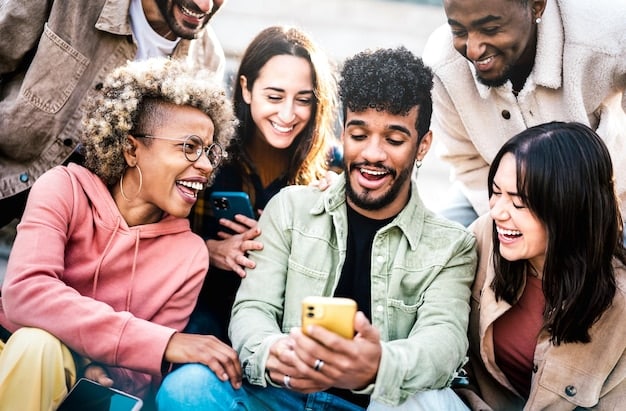The Impact of Social Media on Body Image: Promoting Positive Self-Esteem

The impact of social media on body image is significant, often leading to negative self-perception. Strategies to promote positive self-esteem include mindful engagement, media literacy, and focusing on personal values rather than external appearances.
Social media has become an integral part of our daily lives, connecting us with friends, family, and the world at large. However, its pervasive influence also brings challenges, particularly concerning body image. The constant exposure to curated and often unrealistic portrayals of beauty can significantly impact how we perceive ourselves. Understanding the impact of social media on body image is the first step in promoting positive self-esteem in the digital age.
Understanding the Pervasive Influence of Social Media
The digital landscape is saturated with images and messages that shape our perceptions of what is considered attractive or desirable. Platforms like Instagram, Facebook, and TikTok showcase meticulously crafted images, often filtered and edited to perfection. These idealized representations can create unrealistic expectations and contribute to negative comparisons, impacting self-esteem and body image.
The Role of Filters and Editing
One of the key influencers of negative body image on social media is the extensive use of filters and editing tools. These technologies allow users to alter their appearance drastically, creating a distorted sense of reality. When we are constantly exposed to these altered images, it becomes challenging to maintain a realistic perspective of our own bodies.
The Comparison Trap
Social comparison is a natural human behavior, but social media amplifies this tendency exponentially. Scrolling through feeds filled with seemingly perfect bodies, luxurious lifestyles, and flawless faces can lead to feelings of inadequacy and a desire to conform to these unattainable standards. This constant comparison erodes self-esteem and perpetuates an unhealthy obsession with appearance.

The pervasive nature of social media means that these comparisons never truly stop. The curated content creates an environment where people are being compared 24/7, leading to low self-esteem and perpetuating the cycle of negative self-perception. It is important to understand that what is presented is not always an accurate true representation of reality.
Here are some important points to consider regarding social media’s influence:
- Unrealistic Expectations: Filtered and edited images create standards that are unattainable for most people.
- Constant Comparison: Social media encourages continuous comparison, leading to feelings of inadequacy.
- Mental Health Impact: Negative comparisons and unrealistic expectations can contribute to anxiety, depression, and body dysmorphia.
In conclusion, the power of social media in shaping our perceptions of body image is undeniable. By understanding the mechanisms through which these platforms influence us, we can begin to develop strategies to mitigate their negative effects.
The Psychological Impact of Social Media on Body Image
The effects of social media on body image are not only superficial. The constant bombardment of idealized images can have profound psychological consequences, affecting mental health and overall well-being. Understanding these effects is crucial for developing effective strategies to promote positive self-esteem.
Anxiety and Depression
Studies have shown a strong correlation between social media use and increased levels of anxiety and depression. The pressure to maintain a perfect online persona, coupled with the fear of missing out (FOMO), can lead to chronic stress and unhappiness. Comparing oneself to others can trigger feelings of inadequacy, contributing to depressive symptoms.
Body Dysmorphia
Body dysmorphia is a mental health condition characterized by obsessive preoccupation with perceived flaws in one’s appearance. Social media can exacerbate this condition by providing a platform for constant self-scrutiny and comparison. People with body dysmorphia may spend excessive time examining their appearance in mirrors or taking and editing selfies, further fueling their dissatisfaction.
Eating Disorders
The pursuit of an ideal body, often fueled by social media trends, can lead to unhealthy eating behaviors and even eating disorders. Exposure to thinspiration content, which promotes extreme weight loss, can be particularly harmful. The pressure to conform to unrealistic beauty standards can trigger restrictive diets, excessive exercise, and other dangerous behaviors.

The need to constantly validate oneself with others can become an addiction, leading to negative psychological consequences. It is crucial to break free from this vicious cycle and instead focus on the inner beauty and self acceptance.
Here are some ways social media can affect mental health:
- Increased Anxiety: The need to maintain a perfect online persona leads to chronic stress.
- Depressive Symptoms: Constant comparison triggers feelings of inadequacy and unhappiness.
- Exacerbation of Body Dysmorphia: Social media fuels self-scrutiny and obsession with perceived flaws.
In conclusion, the psychological impact of social media on body image cannot be ignored. Understanding these effects is essential for fostering a healthier relationship with social media and promoting positive self-esteem.
Strategies for Promoting Positive Body Image
Counteracting the negative effects of social media requires a proactive approach to promoting positive body image. By developing healthy habits and cultivating a mindset of self-acceptance, it is possible to navigate the digital world without compromising self-esteem.
Mindful Engagement
One of the most effective strategies is to practice mindful engagement with social media. This involves being aware of the content you consume and how it makes you feel. Unfollow accounts that promote unrealistic beauty standards or trigger negative emotions. Instead, seek out content that is uplifting, inspiring, and promotes body positivity.
Media Literacy
Developing media literacy skills is crucial for discerning the difference between reality and carefully constructed online personas. Recognize that many images are filtered, edited, and curated. Question the messages conveyed by social media content and be critical of the standards they promote.
Focus on Personal Values
Shifting the focus from external appearance to personal values and accomplishments can significantly boost self-esteem. Engage in activities that bring you joy and fulfillment, whether it’s pursuing a hobby, volunteering, or spending time with loved ones. Celebrate your unique qualities and recognize that worth is not determined by physical appearance.
Even without filters and editing tools, keep in mind that everyone wants to portray themselves in the best light and may only post and highlight the best parts of their lives.
Here are some methods to promote positive body image:
- Curate Your Feed: Unfollow accounts that promote negativity and seek out content that is positive and uplifting.
- Limit Screen Time: Reduce the amount of time spent on social media to minimize exposure to unrealistic images.
- Practice Self-Compassion: Treat yourself with kindness and understanding, especially when feeling critical of your appearance.
In summary, developing positive body image strategies is essential for navigating the digital world. By practicing mindful engagement, promoting media literacy, and focusing on personal values, it is possible to cultivate a healthy relationship with social media, and improve self-esteem.
The Role of Education and Awareness
Addressing the pervasive influence of social media on body image requires a concerted effort to educate and raise awareness. By equipping individuals with the knowledge and skills to navigate the digital landscape critically, we can empower them to make informed choices and protect their mental health.
Educational Programs
Schools and community organizations can play a vital role in providing educational programs that address body image and social media literacy. These programs can teach young people how to critically evaluate online content, recognize the use of filters and editing tools, and understand the psychological impact of social comparison.
Parental Involvement
Parents also have an important role. Open conversations about body image, beauty standards, and the realities of social media can help children develop a healthy perspective from a young age. Parents can encourage critical thinking and promote self-acceptance by modeling positive behaviors themselves.
Community Initiatives
Community initiatives can help further awareness and help fight the negative influences of social media on body image. By providing open resources and support, people can come together to discuss concerns.
The more education that one has regarding the tactics and strategies social media tries, there will be a greater ability to avoid the negative influences.
Here are some tactics to help education and awareness:
- Educational Programs: Schools and organizations can lead an initiative to teach about this topic and help people to understand the impact on body image.
- Parental Involvement: Parents who are actively involved with their children are better positioned to teach their children.
- Community Involvement: Support groups and educational classes can help further the cause.
In short, these efforts will help people to deal with the ever-changing world and hopefully not fall into the traps of social media and poor body image.
Building a Supportive Online Community
While social media can contribute to body image issues, it can also be a source of support and empowerment. By intentionally building a positive online community, individuals can find encouragement, validation, and a sense of belonging.
Finding Body Positive Accounts
Seek out accounts that promote body positivity, self-acceptance, and diversity. These accounts often feature real, unfiltered images of people of all shapes, sizes, and backgrounds, challenging the unrealistic beauty standards perpetuated by mainstream media. Engage with content that promotes self-love and celebrates individuality.
Creating a Safe Space
Consider creating your own online space where you can share your experiences, connect with others, and promote positive body image. This could be a blog, a social media account, or a private online group. Foster a culture of respect, empathy, and inclusivity, where everyone feels safe and supported.
Support Groups
Support groups can be found in various corners of the internet and can foster a sense of community and bring about positive change.
Finding like-minded people can make a huge difference in how one looks at themselves or how one perceives social media.
The following methods can help build a supportive environment:
- Find body positive accounts: Look for accounts that promote diverse values and fight the status quo.
- Create a safe space: Use a blog, social media account, or group to highlight ways of dealing with body image and provide valuable resources.
- Support groups: Use these groups as a sounding board and bring up concerns. Let others share their experiences to know how others have found success.
Building and cultivating a positive, supportive community will help with positive self-esteem and help understand the impact of social media.
The Impact of Social Media on Body Image: Strategies for Promoting Positive Self-Esteem
As discussed above, the impact of social media on body image can be profound, influencing self-perception and mental well-being. To counter these negative effects, it is essential to implement strategies for promoting positive self-esteem. These strategies encompass mindful engagement, media literacy, and a focus on personal values, fostering a healthier relationship with social media and enhancing overall self-regard.
Ultimately, understanding the impact of social media on body image is the first step toward cultivating positive self-esteem in the digital age. By employing these strategies and fostering a supportive online environment, individuals can navigate the digital landscape with greater confidence and self-acceptance.
| Key Point | Brief Description |
|---|---|
| 💡 Mindful Engagement | Be aware of consumed content; unfollow negative accounts. |
| 📚 Media Literacy | Recognize edited images and question beauty standards. |
| 💖 Focus on Personal Values | Shift focus from appearance to accomplishments and values. |
| 🫂 Supportive Community | Build and utilize communities that promote positive values. |
Frequently Asked Questions
Social media presents unrealistic beauty standards through edited and filtered images, leading to constant comparisons and feelings of inadequacy, and negatively affecting self-esteem and outlook on body image.
Strategies include curating your feed to follow positive accounts, limiting screen time, and practicing self-compassion. These help create a healthier online experience and reduce negative comparisons.
Yes, educational programs that teach media literacy can help individuals critically evaluate online content and recognize unrealistic beauty standards, allowing them to better understand the impact of social media on body image.
Parents can have open conversations about beauty standards, encourage critical thinking, and model positive self-acceptance, helping their children navigate social media more healthily and build a positive body image.
Support groups and online communities provide encouragement, validation, and a sense of belonging. These foster empathy and resilience, aiding in the development of positive self-esteem regardless of the impact of social media on body image.
Conclusion
In conclusion, social media significantly impacts body image, creating unrealistic expectations and fostering negative self-perception. Developing strategies such as mindful engagement, media literacy, and focusing on personal values are crucial for promoting positive self-esteem and building a healthier relationship with social media. By understanding the impact of social media on body image, we take the initial step to protecting ourselves.